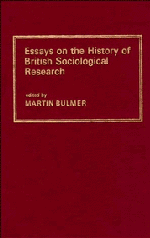13 - Surveys of poverty to promote democracy
Published online by Cambridge University Press: 12 November 2009
Summary
My intention is to reflect critically about the limitations and potentialities of social surveys. It is a supreme irony that in the months following the choice of theme for the York Symposium on which this book is based, the present British Government decided to cut its statistical services by 25 per cent and has threatened to cut resources devoted to surveys by approximately 40 per cent (Sir Derek Rayner, 1981; Government Statistical Services, 1981; Hoinville and Smith, 1982). Part of this chapter will be concerned with explaining, indirectly as well as directly, why this should have happened. The social survey is not only a technological instrument of service to the administration of the modern state: it symbolises forms of power, and it embodies and not only represents necessarily partial values drawn from the historical development of the culture of this country and other countries. On attaining office some political administrations therefore find that the routine compilation and publication of the reports of surveys is embarrassing if not objectionable and steps may be taken to restrict them or control their scope more carefully. This I will endeavour to explain, followed by a discussion of some of the more general functions of social surveys and going on to illustrate certain possibilities from my own work on poverty.
The history and general characteristics of social surveys have been carefully summarised in other chapters by Marsh, Whitehead, Kent and Hakim.
- Type
- Chapter
- Information
- Essays on the History of British Sociological Research , pp. 228 - 235Publisher: Cambridge University PressPrint publication year: 1985
- 1
- Cited by

